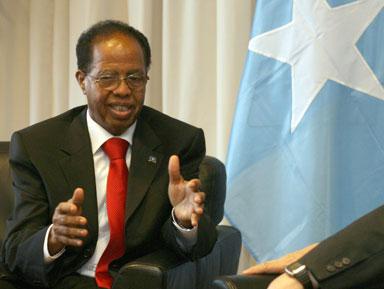
By Ali Musa Abdi
Thursday, April 10, 2008
 |
|
Nur Hassan Hussein knows a solution must include the ICU |
Since taking office in November, Nur Hassan Hussein has engaged Somalia’s Islamist opposition - unlike his predecessor Ali Mohamed Gedi.
"The international community is very pleased by the approach of Prime Minister Hussein, which consists in talking to rival politicians," said Mario Raffaelli, Italy’s special envoy for Somalia.
The signs of hope for Somalia, where civil chaos has defied more than a dozen peace initiatives since the 1991 ouster of former president Mohamed Siad Barre, come even as violence continues to rage across the country.
The Islamic Courts Union, a militia which ousted US-backed warlords from Mogadishu in 2006, briefly ruled large parts of the country before being defeated by Ethiopian forces last year.
Ethiopian-backed Somali government troops are still battling the movement’s military wing and allied clans in a guerrilla war which has left thousands dead and displaced hundreds of thousands.
The prime minister, President Abdullahi Yusuf and Islamist leaders were expected to gather in neighbouring Djibouti this week for ice-breaking contacts. The first step in the roadmap for peace drafted by the new prime minister provides for local initiatives.
The most ambitious project is a scheme whereby traders can organise their own security and policing in Mogadishu’s main mercantile area, the large Bakara market.
Ethiopian and Somali government troops no longer carry out patrols in the area, but in exchange, Bakara vigilantes also have to keep Islamist insurgents at bay.
The initiative is seen as key to restoring stability in the capital, where insurgents have concentrated their attacks over the past year.
But hawks within the government have been reluctant to let Ethiopian troops pull back and the Bakara project has struggled to get off the drawing board.
Hardliners from Somalia’s dominant Hawiye clan and the Islamist opposition had refused to take part in previous reconciliation attempts, arguing that talks should be held outside of Somalia and only after an Ethiopian withdrawal.
The prime minister’s roadmap states that the transitional federal government "is prepared to accept as a venue for the discussions anywhere the government and opposition both agree."
The government’s proposals were met by a markedly more conciliatory tone in the opposition camp.
"The call for dialogue by the PM is encouraging. The Hawiye Traditional Council will support all measures that would help Somalis overcome their differences," Hawiye spokesman Ahmed Derive Ali told AFP.
The leader of the Alliance for the Re-liberation of Somalia - an opposition umbrella group based in Asmara and dominated by Islamists - told AFP his movement was willing to give Hussein a chance.
"Members of the international community are trying to help Somalis overcome their differences and we will do all we can to be flexible and achieve a lasting peace," Sheikh Sharif Sheikh Ahmed said last week.
The cleric nevertheless made it clear that the continued presence of Somali soil of Ethiopian troops he perceives as Christian crusaders would be an obstacle to any agreement.
Government officials have warned the Islamists not to set pre-conditions to dialogue and stressed that bringing all main protagonists to the same table was paramount.
During recent talks with international brokers in Nairobi, Sharif Hassan Sheikh Aden - a former Somali parliament speaker considered a moderate within the opposition - was quick to re-assure his partners. "We accept nothing less than a genuine peace deal with no ulterior motives, we are ready for peace," he said.
The United Nations (UN) special envoy for Somalia, Ahmed Ould Abdallah, also took heart from the recent progress made in paving the way for a viable peace process in the devastated Horn of Africa country. "These are very encouraging new developments," he said in a statement earlier this month.
Source: AFP, April 10, 2008